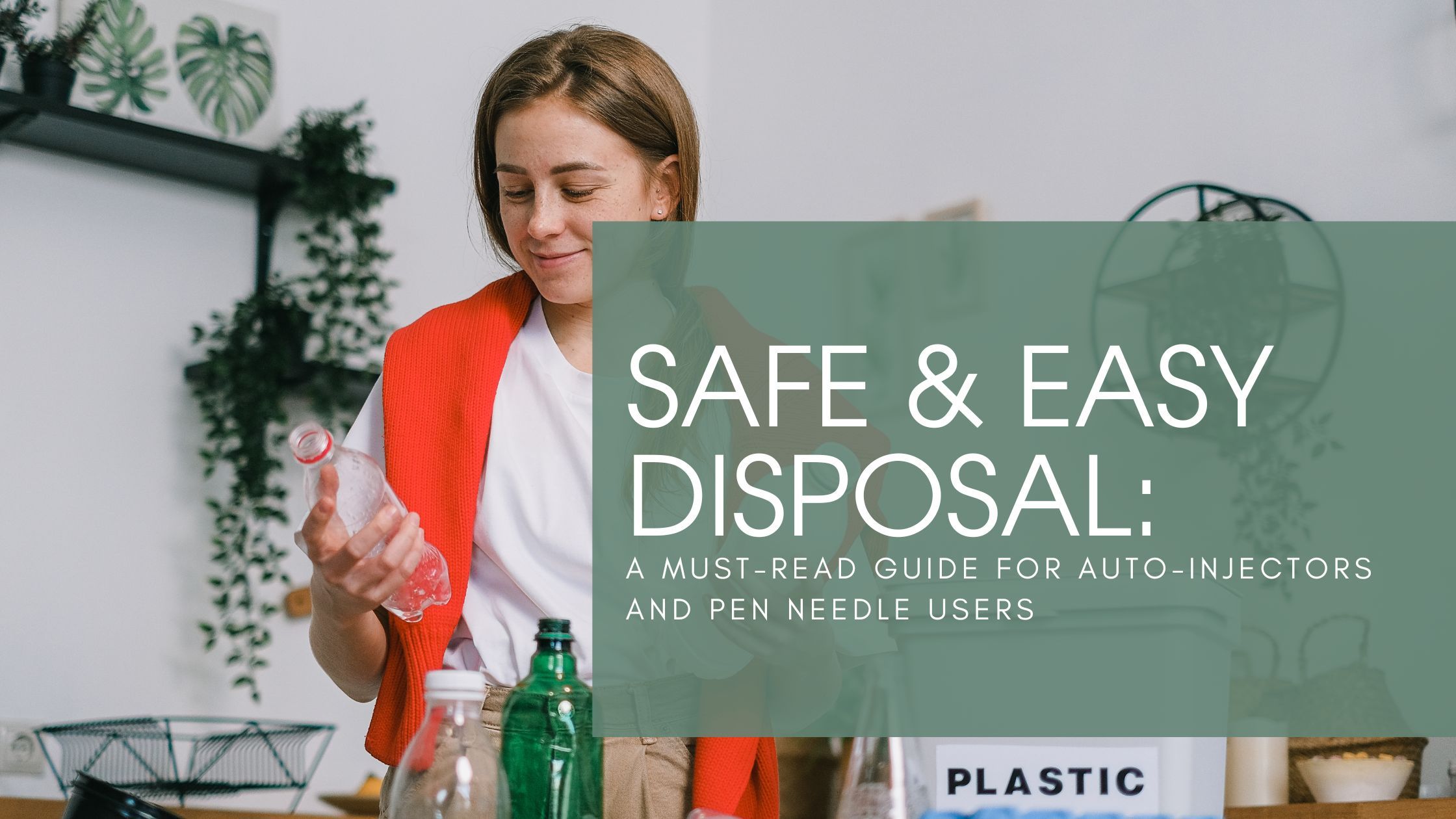
Sharp Solutions: The Safe & Simple Guide to Disposing of Auto-Injectors and Pen Needles
Mar 10, 2025Properly disposing of used sharps, such as needles, syringes, and lancets—is crucial for preventing injuries, protecting sanitation workers, and reducing environmental hazards.
Whether you use auto-injectors for medication or pen needles for diabetes management, following safe disposal practices ensures the well-being of both your community and the environment.
This guide will walk you through the best ways to handle and dispose of sharps responsibly.
What is a Sharp?
A sharp is any medical device with a pointed or sharp edge that can puncture or cut the skin. Common sharps include:
- Auto-injectors (such as EpiPens, Ozempic, and Trulicity pens)
- Pen needles
- Syringes
- Lancets
- Infusion sets
Why Proper Sharps Disposal Matters
Used sharps should be placed immediately into a designated sharps disposal container. These containers are designed to be:
- Puncture-resistant
- Leak-resistant on the sides and bottom
- Equipped with a tight-fitting, puncture-resistant lid
The Dangers of Improper Disposal
Improperly discarded sharps can pose serious health and safety risks, including:
- Injuries to sanitation workers – Loose needles can puncture garbage bags, leading to accidental needle sticks and potential exposure to infections.
- Environmental contamination – If sharps end up in landfills or water sources, they can introduce hazardous waste into the environment.
- Risks to the public – Discarded needles in public areas increase the likelihood of accidental injuries, especially for children and pets.
Where Can I Get a Sharps Disposal Container?
If an FDA-cleared sharps disposal container is unavailable, you can use a household container that meets the following criteria:
- Made of heavy-duty plastic
- Has a tight-fitting, puncture-resistant lid to prevent sharps from coming out
- Upright and stable during use
- Leak-resistant
- Properly labeled to indicate hazardous waste inside
Common household containers that work well include empty laundry detergent bottles, dishwasher soap boxes, and other hard plastic containers.
What Should I Do When My Disposal Container is Almost Full?
Once your sharps disposal container is nearly full, follow your community’s disposal guidelines. Regulations for sharps disposal vary by state and locality. For more information on safe sharps disposal and to find a disposal site near you, visit SafeNeedleDisposal.org.
Traveling with Sharps: How to Stay Safe on the Go
If you use auto-injectors or pen needles while traveling, follow these tips to safely manage sharps disposal:
- Bring a portable sharps container – Many travel-sized disposal containers are available at pharmacies.
- Check TSA regulations – You are allowed to carry needles and auto-injectors in carry-on luggage, but it's best to notify security officers.
- Plan ahead for disposal – Research local disposal regulations at your destination, or bring a secure container to transport used sharps back home.
How to Order a Free Sharps Disposal or Medicine Return Container
Some medication manufacturers provide free sharps disposal containers for patients using their injectable medications.
- For Wegovy or Ozempic (Novo Nordisk products): Request a free sharps container by calling 1-888-905-0135 or ordering online at NovoCare.
- For Mounjaro, Zepbound, or Trulicity (Eli Lilly products): Call 1-800-545-5979 for instructions on sharps disposal options.
Mail-Back Programs & Drop-Off Locations
Many pharmacies, hospitals, and waste facilities offer safe sharps disposal options. Some common solutions include:
- Mail-back programs – Some manufacturers and third-party companies provide prepaid containers that allow you to mail back used sharps safely.
- Drop-off locations – Pharmacies, hospitals, and some public health offices accept sharps containers for proper disposal.
- Household hazardous waste events – Many local governments organize events where residents can drop off medical waste, including sharps.
State-Specific Sharps Disposal Guidelines
Disposal regulations vary by state. Below are disposal guidelines for Delaware, Maryland, and Pennsylvania.
Delaware
- Household Trash Disposal: Place sealed sharps containers in regular household trash. Do not place them in recycling bins.
- Community Disposal Programs: The Delaware Solid Waste Authority (DSWA) accepts sharps during Household Hazardous Waste Collection Events.
- Call the Citizen’s Response Line at 800-404-7080 or visit the DSWA website for event details.
Maryland
- Household Trash Disposal: Place sealed sharps containers in regular household trash. Do not place them in recycling bins.
- County-Specific Disposal Programs:
- Frederick County: Mail-back or drop-off options are available. Call 1-800-643-1643 or visit the Safe Needle Disposal website.
- Anne Arundel County: Use a heavy-duty plastic container, add bleach, seal, label "Sharps," and dispose of it with household trash.
Pennsylvania
- Household Trash Disposal: Disinfect sharps by soaking them in a bleach solution (one teaspoon of bleach per half gallon of water for at least 20 minutes). Place disinfected sharps in a puncture-resistant container, seal, label, and dispose of with household trash.
- County-Specific Disposal Programs:
- Delaware County: Follow disinfection and disposal steps outlined above.
- Chester County: Follow county-recommended sharps disposal guidelines.
By following these disposal methods, you can safely dispose of used sharps while protecting your community and the environment.
If you have questions on how to dispose of your sharps please ask your healthcare provider for assistance.
Or reach out to your local waste management authority or visit SafeNeedleDisposal.org for more information.